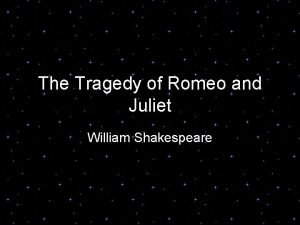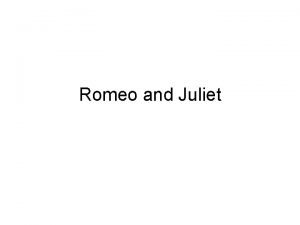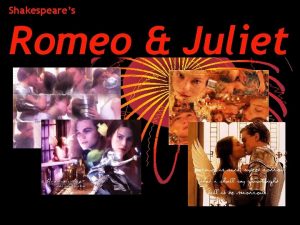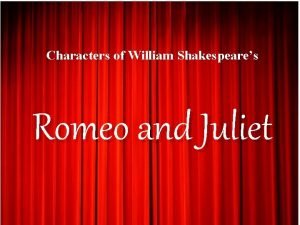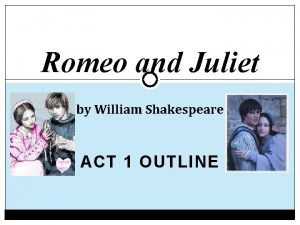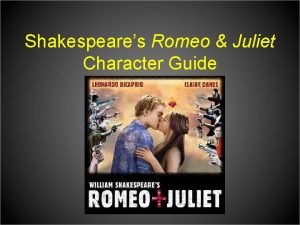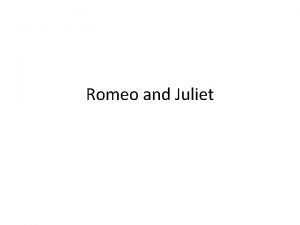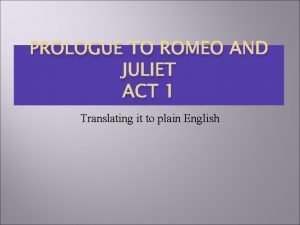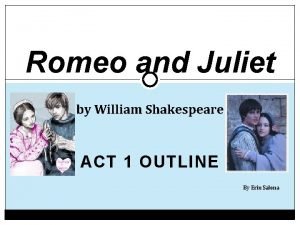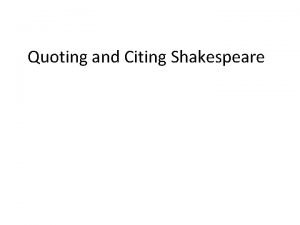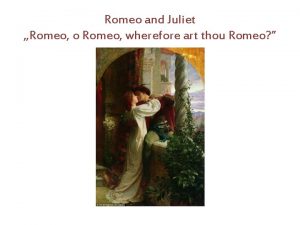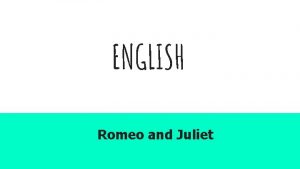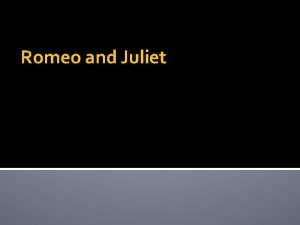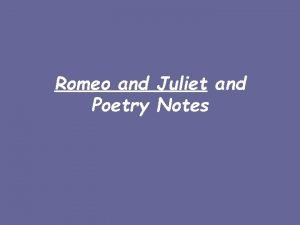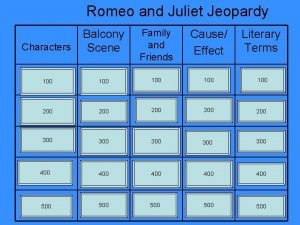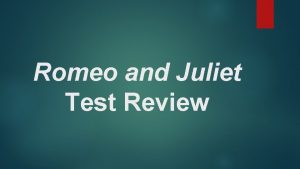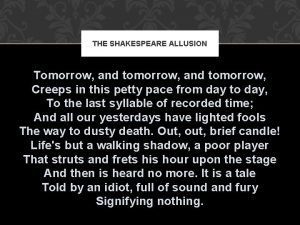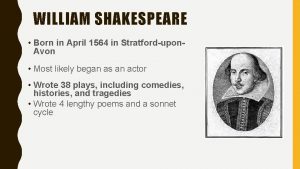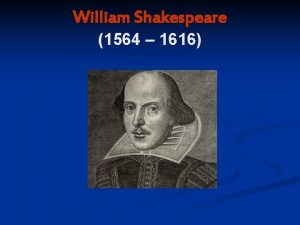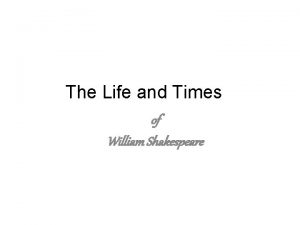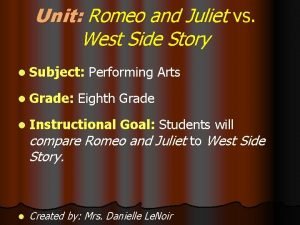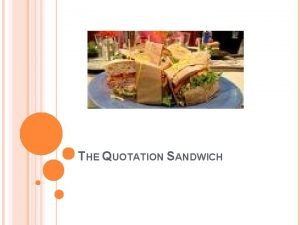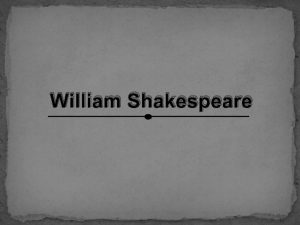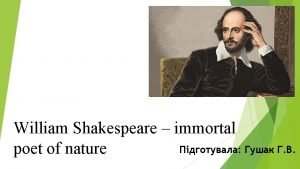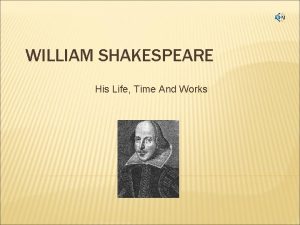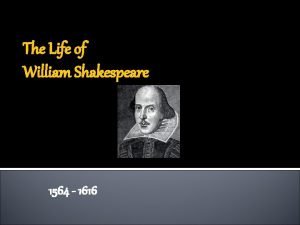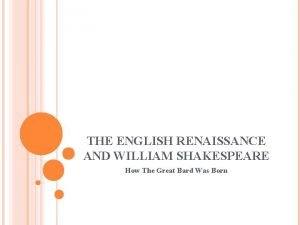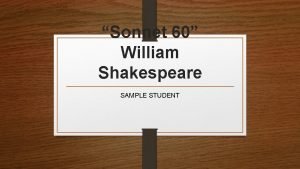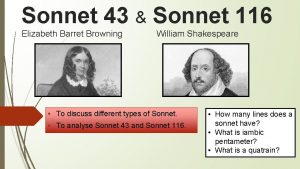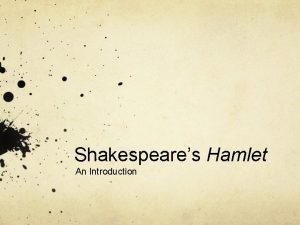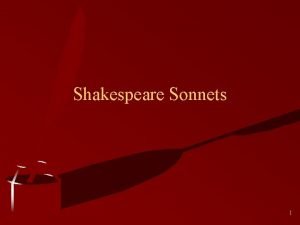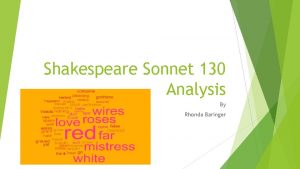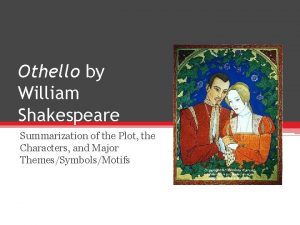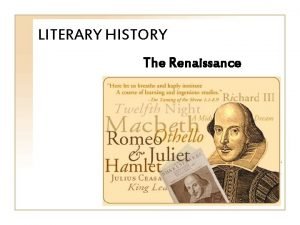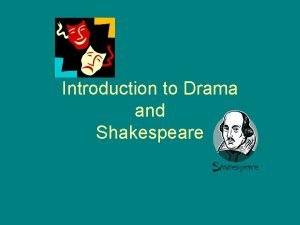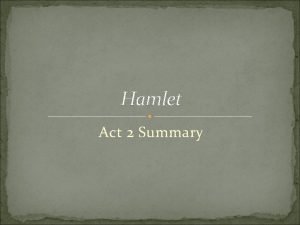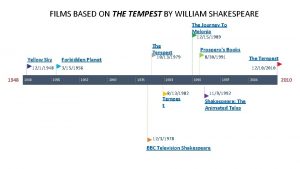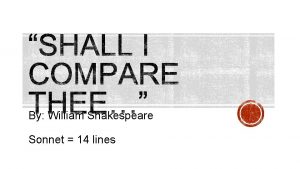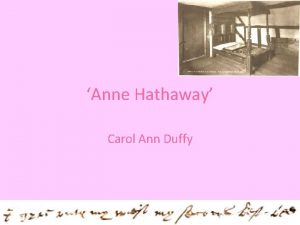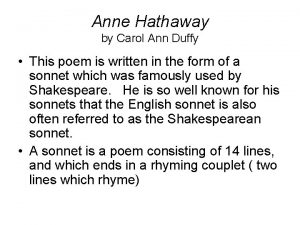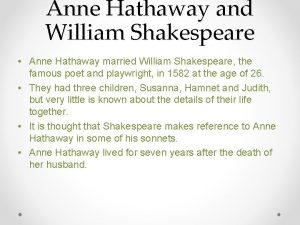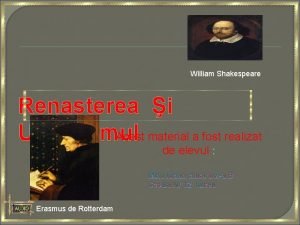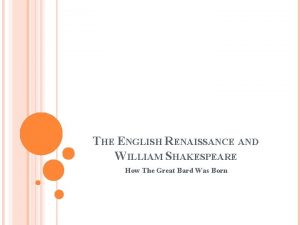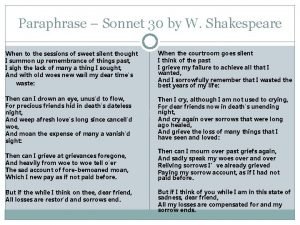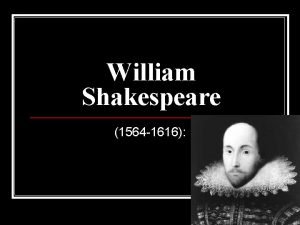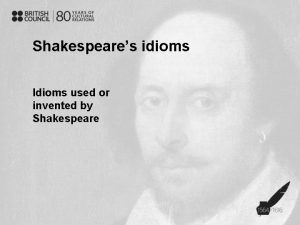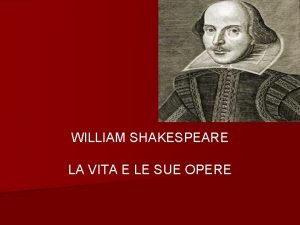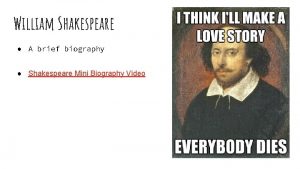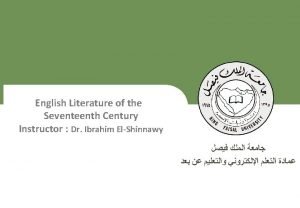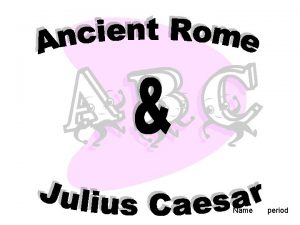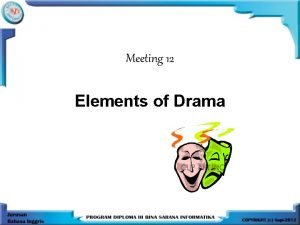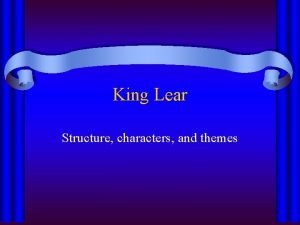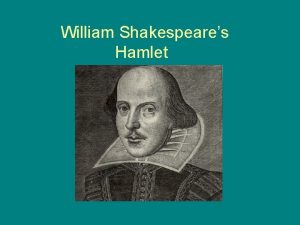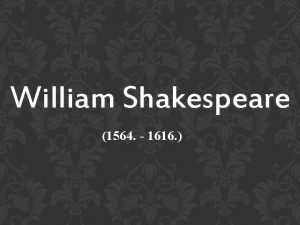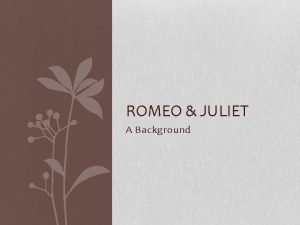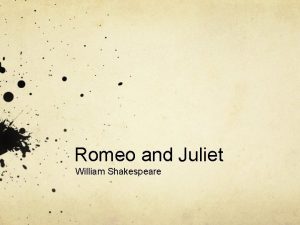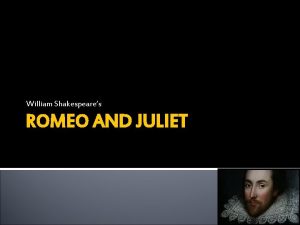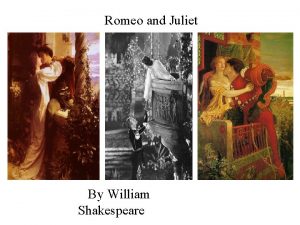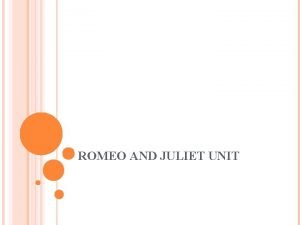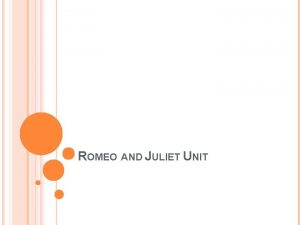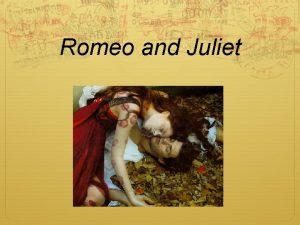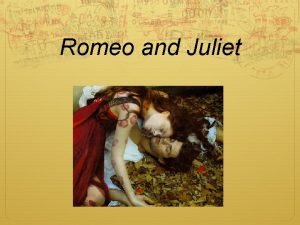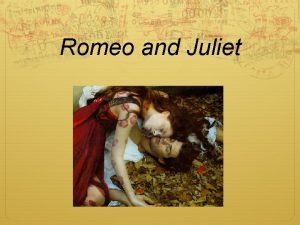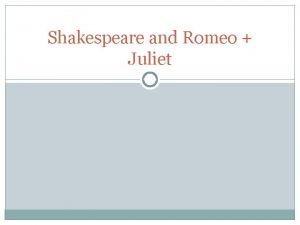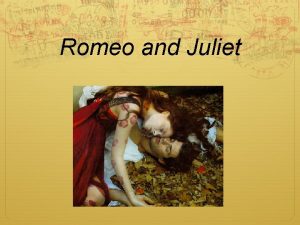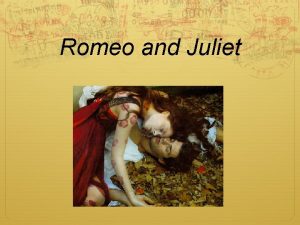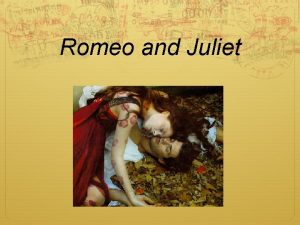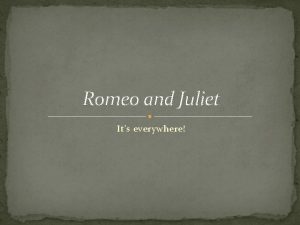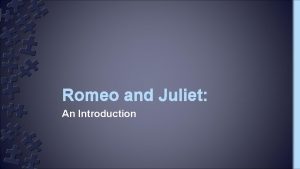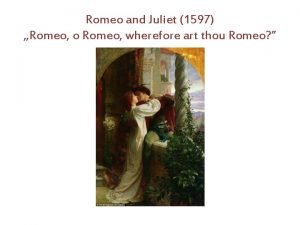Romeo and Juliet William Shakespeare Unit Outline o








































![…and back to love again Romeo: [To Juliet. ] If I profane with my …and back to love again Romeo: [To Juliet. ] If I profane with my](https://slidetodoc.com/presentation_image_h/7511f01c4c64c54b218c13c4957e1612/image-41.jpg)












































![ROMEO [To JULIET] If I profane with my unworthiest hand This holy shrine, the ROMEO [To JULIET] If I profane with my unworthiest hand This holy shrine, the](https://slidetodoc.com/presentation_image_h/7511f01c4c64c54b218c13c4957e1612/image-86.jpg)






















- Slides: 108

Romeo and Juliet William Shakespeare

Unit Outline o This text is worth 25% of your final literature grade o You will have to answer ONE question from a choice of two o This is on the second literature paper, with the poetry anthology questions o You are assessed on your knowledge of the play (AO 1), analysis of language (AO 2), understanding of social and historical context (AO 3) and the quality of your written expression (AO 4) – there are 40 marks available Question Format: o You will get an extract from the play to analyse, and will have to link this to the play as a whole OR o You will have a question about the whole play to answer Whichever question you answer, you need to show knowledge and understanding of the whole play

Two households, both alike in dignity, In fair Verona, where we lay our scene, From ancient grudge break to new mutiny, Where civil blood makes civil hands unclean. From forth the fatal loins of these two foes A pair of star-cross'd lovers take their life; Whose misadventured piteous overthrows Do with their death bury their parents' strife. The fearful passage of their death-mark'd love, And the continuance of their parents' rage, Which, but their children's end, nought could remove, Is now the two hours' traffic of our stage; The which if you with patient ears attend, What here shall miss, our toil shall strive to mend.

Prologue This is where the play is set (it is in Italy) They are the same in terms of status Two households, both alike in dignity, An old ‘grudge’ has turned into new In fair Verona, where we lay our scene, fighting and the town seems to be at From ancient grudge break to new mutiny, war Where civil blood makes civil hands unclean. From forth the fatal loins of these two foes ‘Star-cross’d’ means that fate (the A pair of star-cross'd lovers take their life; stars) are against them Whose misadventured piteous overthrows Do with their death bury their parents' strife. ‘Take their life’ means begin their The fearful passage of their death-mark'd love, life And the continuance of their parents' rage, Which, but their children's end, nought could remove, Here we are told that they Is now the two hours' traffic of our stage; die – ending the argument The which if you with patient ears attend, What here shall miss, our toil shall strive to mend. That is what the play is about – for the next two hours!

So – we now know what the play is about o Two ‘households’, of equal status o An ‘ancient grudge’ – we never really find out what this is o A pair of lovers, who will die – thus ending their parents feud Fairly straightforward really! But also notice: o Direct address to the audience – convention of a prologue o The equality of the families (two / both alike); theme of status o Violence hinted at (blood / unclean / fatal) o Theme of fate intervening in life o Sense of the stage and theatricality – we need ‘patient ears’ This is the higher level stuff…

Act One Scene One Abraham and Balthazar: Montague Two more characters arrive on stage and a fight breaks out, only stopped with the arrival of… Samson and Gregory: Capulets They brag about their hatred of the Montagues and make crude comments about what they would do to their women. There is a sinister sense of violence that accompanies their joking. Here we see that the feud even involves the servants of each family, and that the ordinary citizens of the town are fed up of the constant fighting Benvolio: Montague ‘Put up your swords; you know not what you do’ He is a benevolent peacekeeper, unlike… Tybalt: Capulet ‘…I hate hell, all Montagues, and thee: Have at thee, coward!’ Down with the Capulets! down with the Montagues!

Opening scene summary – Answer ONE: Level One (Grades 1 – 3) o What happens in the first 75 lines of the play? Include as many details as you can remember. Level Two (Grades 4 – 6) o How does Shakespeare make this an exciting opening to the play? Include at least one significant quotation. Level Three (Grades 7 – 9) o Why might Shakespeare wish to open his play with such a violent scene?

Uh-oh – now they’re in trouble… Rebellious subjects, enemies to peace, Profaners of this neighbour-stained steel, -Will they not hear? What, ho! you men, you beasts, That quench the fire of your pernicious rage With purple fountains issuing from your veins, On pain of torture, from those bloody hands Throw your mistemper'd weapons to the ground, And hear the sentence of your moved prince. Three civil brawls, bred of an airy word, By thee, old Capulet, and Montague, Have thrice disturb'd the quiet of our streets, And made Verona's ancient citizens Cast by their grave beseeming ornaments, To wield old partisans, in hands as old, Canker'd with peace, to part your canker'd hate: If ever you disturb our streets again, Your lives shall pay the forfeit of the peace.

Annotate the Prince’s speech: look at the underlined parts to start. What imagery is created? What new information do we learn? What does he threaten at the end? Uh-oh – now they’re in trouble… Rebellious subjects, enemies to peace, Profaners of this neighbour-stained steel, -Will they not hear? What, ho! you men, you beasts, That quench the fire of your pernicious rage With purple fountains issuing from your veins, On pain of torture, from those bloody hands Throw your mistemper'd weapons to the ground, And hear the sentence of your moved prince. Three civil brawls, bred of an airy word, By thee, old Capulet, and Montague, Have thrice disturb'd the quiet of our streets, And made Verona's ancient citizens Cast by their grave beseeming ornaments, To wield old partisans, in hands as old, Canker'd with peace, to part your canker'd hate: If ever you disturb our streets again, Your lives shall pay the forfeit of the peace.

Romeo o We haven’t yet met the romantic hero of the play – this is his father’s view of Many a morning hath he there been seen, how he has been acting lately. With tears augmenting the fresh morning dew. Adding to clouds more clouds with his deep sighs; But all so soon as the all-cheering sun Should in the furthest east begin to draw The shady curtains from Aurora's bed, Away from the light steals home my heavy son, And private in his chamber pens himself, Shuts up his windows, locks far daylight out And makes himself an artificial night: o What is your impression of him, based on this passage? __________________________________ __________________________________ Black and portentous must this humour prove, _________________ Unless good counsel may the cause remove. ________________

Romeo – what is his view of the world? Alas, that love, whose view is muffled still, Personification of love: suggests it is beyond Romeo’s control Should, without eyes, see pathways to his will! Where shall we dine? O me! What fray was here? Yet tell me not, for I have heard it all. Notice how he switches the subject: suggests his slightly inconsistent nature Here's much to do with hate, but more with love. Why, then, O brawling love! O loving hate! O any thing, of nothing first create! O heavy lightness! serious vanity! Mis-shapen chaos of well-seeming forms! Feather of lead, bright smoke, cold fire, sick health! Identify the oxymorons: why have these been included? Still-waking sleep, that is not what it is! This love feel I, that feel no love in this. Dost thou not laugh? What is your first impression of Romeo as a character? What is Romeo’s view of the feud? Remember he will die as a consequence of it…

What is your first impression of Romeo as a character? PETER Explanation Romeo is here presented as a dreamer, not really connected with the feud that seems to consume the rest of his family. He doesn’t want to hear the details, saying ‘tell me not, for I have heard it all’, and his weary tone here suggests he is as tired of the constant brawls as the other citizens of the town. Clearly he is a character more interested in love than hate, and his manner here contrasts greatly with the violent fight that opens the play. Response o In addition… (continue with a new point, and Point Evidence Terminology follow the same PETER structure) o Key terminology: Oxymoron / personification / exclamation / juxtaposition / paradox / short sentences

Romeo’s lovesickness From love's weak childish bow she lives unharm'd. She will not stay the siege of loving terms, Nor bide the encounter of assailing eyes, o The girl that Romeo loves has taken a vow of chastity… o She is ‘unharm’d’ by cupid’s arrow o What words that you might associate with battle can you identify? o What else do we learn about this girl in Scene One? Nor ope her lap to saint-seducing gold: O, she is rich in beauty, only poor, That when she dies with beauty dies her store.

‘Examine other beauties’ o What do you make of Benvolio’s advice? o Does Romeo seem like he will easily change his mind about his love for Rosaline? ‘Farewell : thou canst not teach me to forget …’

Phew – End of Scene One! o This is a fairly lengthy and dramatic scene o Draw a flow chart in your books so you can track the events in this opening scene Sampson and Gregory enter and joke about their hatred of the Montagues Then…

Act 1 Scene 2 o Old Capulet seems happy to do what the Prince ordered – he says that ‘'tis not hard, I think, / For men so old as we to keep the peace. ’ o This suggests that the feud is not that important, and that the younger generation is needlessly keeping it going o This will have TRAGIC consequences o He is talking to Paris – an important character in the play

Attitudes towards marriage My child is yet a stranger in the world; She hath not seen the change of fourteen years, Let two more summers wither in their pride, Ere we may think her ripe to be a bride. Annotate this extract – consider what we learn about: • Juliet’s father’s hopes for her future • Attitudes towards marriage in Shakespeare’s time

Attitudes towards marriage Capulet is possessive about his daughter; sees her as his to control Capulet is almost pleading with Paris here – clearly he wants Paris to marry his daughter as it would be a useful connection for him – just not quite yet Notice that Juliet does not have a say in her future! Reminds us of Juliet’s innocence – she has not seen much of the world My child is yet a stranger in the world; She hath not seen the change of fourteen years, Let two more summers wither in their pride, Ere we may think her ripe to be a bride. The word ‘ripe’ has connotations of fertility (childbearing) but is a disturbing image to a modern audience; suggests she is fruit to be picked rather than a person in her own right She is thirteen years old – this is quite shocking to a modern audience but wouldn’t have been that unusual in Shakespeare’s time

Paris’ short response: ‘Younger than she are happy mothers made’ o Yikes! She is THIRTEEN years old. Capulet was just talking about marriage – now Paris is mentioning babies! o Remember the play is set at a very different time, when girls were expected to marry young and bear children in order to provide a (male) heir for their husbands o o However Capulet does acknowledge that ‘too soon marr'd are those so early made’ which means that having children too early can spoil ‘marr’ young girls. Ideally, he wants to hang on to his only child for a little longer. If Juliet agrees to marriage, then he will give his consent – so she is allowed a say after all!

Important Plot Development… This night I hold an old accustom'd feast, Whereto I have invited many a guest, Such as I love; and you, among the store, One more, most welcome, makes my number more. At my poor house look to behold this night Earth-treading stars that make dark heaven light: Such comfort as do lusty young men feel When well-apparell'd April on the heel Of limping winter treads, even such delight Among fresh female buds shall you this night Inherit at my house; hear all, all see, And like her most whose merit most shall be: Which on more view, of many mine being one May stand in number, though in reckoning none, Come, go with me. He’s having a party – tonight! Capulet’s advice to Paris is similar to that of Benvolio to Romeo – have a look around because you might find someone better… Notice: imagery of heaven and earth; theme of love and lust; imagery of nature; suggestion of the fickle nature of male desire

Fate and chance – the first example! o Capulet gives a list of names to a servant, and tells him to invite all the people on the list to a party… o However – the servant can’t read o Luckily – in comes Romeo and Benvolio. o Benvolio is still repeating his earlier advice: o o ‘Take thou some new infection to thy eye, And the rank poison of the old will die. The servant asks Romeo if he can read – he can!

So – who’s going? 'Signior Martino and his wife and daughters; County Anselme and his beauteous sisters; the lady widow of Vitravio; Signior Placentio and his lovely nieces; Mercutio and his brother Valentine; mine uncle Capulet, his wife and daughters; my fair niece Rosaline; Livia; Signior Valentio and his cousin Names to notice here: 1. Mercutio is a friend of Romeo – he will be important later 2. Rosaline, who Romeo is in love with 3. Tybalt – another character who will be significant in a few scenes time Tybalt, Lucio and the lively Helena. ' A fair assembly: whither should they come? What do you think Romeo will want to do after reading this invitation?

Compare her face with some that I shall show, And I will make thee think thy swan a crow. Once again, Benvolio tells Romeo to look elsewhere for a girlfriend. It’s almost as if he knows that getting involved with a Capulet will only lead to trouble… One fairer than my love! the all-seeing sun Ne'er saw her match since first the world begun. Romeo is pretty certain that no-one is more beautiful than Rosaline – consider how Romeo is presented as quite an obsessive character – his language is full of hyperbole and epic imagery.

Act 1, Scene 3: The Capulets Juliet Lady Capulet The Nurse Who do you think Juliet is closer to? Her mother, or the nurse?

Double Meanings LADY CAPULET Marry, that 'marry' is the very theme I came to talk of. Tell me, daughter Juliet, How stands your disposition to be married? JULIET It is an honour that I dream not of. What does Juliet mean here?

Double Meanings LADY CAPULET Marry, that 'marry' is the very theme I came to talk of. Tell me, daughter Juliet, How stands your disposition to be married? JULIET It is an honour that I dream not of. What does Juliet mean here? She might mean ‘to be married is a great honour, beyond my wildest dreams’ – which is probably what her mother hears But she could also mean – I have not thought (or dreamed) about marriage – remember she is still very young If it is the second interpretation, then Juliet is demonstrating her slightly rebellious nature, and willingness to be somewhat sarcastic to her own mother

Juliet under pressure o Both the nurse and Lady Capulet seem to want Juliet to marry Paris Nurse: A man, young lady! lady, such a man As all the world--why, he's a man of wax. …he's a flower; in faith, a very flower. Lady Capulet calls Paris ‘valiant’ ‘This precious book of love, this unbound lover, To beautify him, only lacks a cover’ What is Juliet’s response? Do we see the same lightly sarcastic attitude as her earlier remarks?

What is your first impression of Juliet as a character? PETER Point Evidence Terminology Explanation Response Juliet is shown as someone who knows her own mind, and will not do something just because her mother wants her to. For example, she says… And her tone here is… Which suggests… Overall, Juliet’s attitude here suggests to the audience that… In addition… (continue with a new point, and follow the same PETER structure) Key terminology: tone / short sentences / double meanings / metaphor

Act 1, Scene 4: Mercutio Mercurial: adjective subject to sudden or unpredictable changes of mood or mind. "his mercurial temperament" Mercury: Roman God of poetry, luck and trickery. Mercury had many talents. He could fly faster than most of the other gods, partly because of his winged sandals. He was trustworthy, bright and very loyal. He could negotiate well to get himself and others out of trouble. Consider how he is presented in this scene – how is he different to Romeo and Benvolio? ‘If love be rough with you, be rough with love’

MERCUTIO: O, then I see Queen Mab hath been with you. She is the fairies' midwife, and she comes In shape no bigger than an agate stone On the forefinger of an alderman, Drawn with a team of little atomi Over men's noses as they lie asleep. Her chariot is an empty hazelnut, Made by the joiner squirrel or old grub, According to Mercutio's vivid description, Queen Mab is a tiny fairy that rides around in a coach made out of an "empty hazelnut" with spider's "legs" for wheel spokes. The coach is driven by an even tinier "grey-coated gnat" and drawn by a "team of little atomi" (tiny atoms). Time out o' mind the fairies' coachmakers: Her wagon spokes made of long spinners' legs, The cover, of the wings of grasshoppers; Her traces, of the smallest spider web; Her collars, of the moonshine's wat'ry beams; Her whip, of cricket's bone; the lash, of film; Her wagoner a small grey-coated gnat, Not half so big as a round little worm Pricked from the lazy finger of a maid. So, why is everything about Queen Mab so tiny and sexual? To answer that, we need to think about what it is that prompts Mercutio's wild rant in the first place. Fed up with Romeo's lovesick moping for Rosaline, Mercutio taunts his buddy by saying that Queen Mab must have paid him a visit in the dream Romeo tries to tell him about. Mercutio also informs Romeo that dreams "are the children of an idle brain, " which is another way of saying that Romeo is an idiot and his dreams about Rosaline are ridiculous (1. 4. 104). Given the context of the speech, it seems like Mercutio is suggesting that, like Queen Mab, dreams (especially Romeo's) are small and insignificant.

And in this state she gallops night by night Through lovers' brains, and then they dream of love; O'er courtiers' knees, that dream on curtsies straight; O'er lawyers' fingers, who straight dream on fees; O'er ladies' lips, who straight on kisses dream, Which oft the angry Mab with blisters plagues, Because their breaths with sweetmeats tainted are. Sometimes she gallops o'er a courtier's nose, And then dreams he of smelling out a suit; And sometimes comes she with a tithe-pig's tail Tickling a parson's nose as 'a lies asleep, Then dreams he of another benefice. Queen Mab spends her time galloping over the noses and lips of sleepers, filling their dreams with wild fantasies (lovers dream of love, soldiers dream of slitting throats, lawyers dream of winning lawsuits, etc. ) Sometimes she driveth o'er a soldier's neck, And then dreams he of cutting foreign throats, Of breaches, ambuscadoes, Spanish blades, Of healths five fathom deep; and then anon Drums in his ear, at which he starts and wakes, And being thus frighted, swears a prayer or two And sleeps again. This is that very Mab That plats the manes of horses in the night And bakes the elflocks in foul sluttish hairs, Which once untangled much misfortune bodes. This is the hag, when maids lie on their backs, That presses them and learns them first to bear, Making them women of good carriage. This is she! Mab (whose name is also a slang word for "whore") is also kind of scary. When she's in a bad mood, she plagues women who dream of "kisses" with nasty sores ("blisters") that might just be cold sores but might also be nastier things, like pox from syphilis, and she's fond of making young, virginal girls have naughty dreams.

The Queen Mab speech (Quite a famous part of the play) o Unlike Romeo, Mercutio does not believe that dreams can foretell future events. Instead, painting vivid pictures of the dreamscape people inhabit as they sleep, Mercutio suggests that the fairy Queen Mab brings dreams to humans as a result of men's worldly desires and anxieties. To him, lawyers dream of collecting fees and lovers dream of lusty encounters; the fairies merely grant carnal wishes as they gallop by. In juxtaposing lawyers and lovers, soldiers and the fairy entourage, his eloquent speech touches on a number of the play's opposing themes such as love and hate, fantasy and reality, idealism and cynicism. o It also gives insight into Mercutio's antagonistic and cynical nature: His description of the lovers is brief compared with the bloodthirsty image of the soldier who dreams of "cutting foreign throats. " The beauty of the ladies' lips is quickly followed by the image of Mab blistering their lips with plague sores because the women had eaten too many sweets. Mercutio is down-to-earth, whereas Romeo continues to indulge in idealistic, lovelorn daydreaming. Indeed, his dream speech contains all the elements that will conspire to bring down Romeo and Juliet's starry-eyed dream of love to the depths of the tomb.

Foreshadowing / Proleptic Irony – annotate this quotation I fear too early: for my mind misgives Some consequence, yet hanging in the stars, Shall bitterly begin his fearful date With this night's revels; and expire the term Of a despised life, clos'd in my breast, By some vile forfeit of untimely death: But He that hath the steerage of my course Direct my sail!

Foreshadowing / Proleptic Irony Romeo feels that something bad will happen as a consequence of this evening I fear too early: for my mind misgives Some consequence, yet hanging in the stars, Shall bitterly begin his fearful date With this night's revels; and expire the term Of a despised life, clos'd in my breast, By some vile forfeit of untimely death: But He that hath the steerage of my course Direct my sail! But despite Romeo’s fears, he leaves it up to fate - this suggests that he thinks the direction of his life is out of his control Remember the ‘star cross’d lovers’ from the prologue? He uses imagery of death and disease here, and lots of negative language (bitterly; fearful; expire; despised etc)

Act 1 Scene 5 – the Capulet party… o Capulet plays the welcoming host, encouraging his guests to dance, enjoy the music and to mingle. o Romeo spots Juliet across the room and asks ‘ What lady is that, which doth enrich the hand Of yonder knight?

Romeo’s love-struck speech (this time he means it) O, she doth teach the torches to burn bright! It seems she hangs upon the cheek of night Like a rich jewel in an Ethiop's ear; Beauty too rich for use, for earth too dear! So shows a snowy dove trooping with crows As yonder lady o'er her fellows shows. The measure done, I'll watch her place of stand And, touching hers, make blessed my rude hand. Did my heart love till now? forswear it, sight! For I ne'er saw true beauty till this night.

Romeo’s love-struck speech (this time he means it) O, she doth teach the torches to burn bright! It seems she hangs upon the cheek of night Like a rich jewel in an Ethiop's ear; Beauty too rich for use, for earth too dear! So shows a snowy dove trooping with crows As yonder lady o'er her fellows shows. The measure done, I'll watch her place of stand And, touching hers, make blessed my rude hand. Did my heart love till now? forswear it, sight! For I ne'er saw true beauty till this night. Are you convinced by this – is love at first sight genuine, or simply based on lust? What is it about Juliet that Romeo seems to fall in love with? Annotate: images of light and dark; ways in which Romeo suggests Juliet is heavenly; what Romeo says he will do next; the way in which Romeo dismisses his feelings for Rosaline

How does Shakespeare present Romeo’s feelings here? PETER Romeo is presented here as. . . Point For example, he says… Evidence Using a simile / imagery of… Terminology Which suggests… Explanation Overall, Romeo’s reaction to Juliet here suggests to the audience that… Response In addition… (continue with a new point, and follow the same PETER structure) Key terminology: simile / exclamation / rhetorical question / hyperbole / irony

How does Shakespeare present Romeo’s feelings here? PETER Point Evidence Terminology Explanation Response Romeo is presented here as entranced by Juliet’s beauty. For example, he compares her to a ‘rich jewel’ and a ‘snowy dove’, and these similes suggest both her value as a precious object and her purity, compared to the ‘crows’ around him. Overall, Romeo’s reaction to Juliet here suggests to the audience that he has forgotten all about Rosaline, and is now devoted to a new lover. In addition… (continue with a new point, and follow the same PETER structure) Key terminology: simile / exclamation / rhetorical question / hyperbole / irony

o Tybalt’s angry reaction reminds us of the vicious fight in Scene One, and the way in which the younger generation seem determined to keep up the feud even if the older members of the families are happy to keep the peace. o Capulet is relaxed about the intrusion, and wants Tybalt to forget about it – the last thing he wants is a brawl at his party. o Tybalt’s language is full of hate, and contrasts sharply with the loving words uttered by Romeo in the lines above – you will notice the play is full of contrast and meaningful juxtapositions. o Tybalt’s prophecy that this will ‘convert to bitter gall’ echoes Romeo’s words at the end of Scene Four – again we are told that something bad will happen as a consequence of the party… From love to hate… This, by his voice, should be a Montague. -- Fetch me my rapier, boy: --what, dares the slave Come hither, cover'd with an antic face, To fleer and scorn at our solemnity? Now, by the stock and honour of my kin, To strike him dead I hold it not a sin… …A villain, that is hither come in spite, To scorn at our solemnity this night… …'Tis he, that villain, Romeo… …I will withdraw: but this intrusion shall, Now seeming sweet, convert to bitter gall.
![and back to love again Romeo To Juliet If I profane with my …and back to love again Romeo: [To Juliet. ] If I profane with my](https://slidetodoc.com/presentation_image_h/7511f01c4c64c54b218c13c4957e1612/image-41.jpg)
…and back to love again Romeo: [To Juliet. ] If I profane with my unworthiest hand This holy shrine, the gentle fine is this, -- My lips, two blushing pilgrims, ready stand To smooth that rough touch with a tender kiss. Juliet: Good pilgrim, you do wrong your hand too much, Which mannerly devotion shows in this; For saints have hands that pilgrims' hands do touch, And palm to palm is holy palmers' kiss. Romeo: Have not saints lips, and holy palmers too? Juliet: Ay, pilgrim, lips that they must use in prayer. Romeo: O, then, dear saint, let lips do what hands do; They pray, grant thou, lest faith turn to despair. Juliet: Saints do not move, though grant for prayers' sake. Romeo: Then move not while my prayer's effect I take. This is an example of a sonnet – 14 lines with an ABAB structure, ending with a couplet. This demonstrates the lovers symmetry with each other, as they match each other’s language in a very formal structure. Shakespeare uses an extended metaphor of religion in order to suggest the purity of Romeo and Juliet’s love. However they end their meeting with a passionate kiss, also suggesting their desire for each other.

Doomed lovers? Romeo: o O dear account! my life is my foe's debt. Juliet: My only love sprung from my only hate! Too early seen unknown, and known too late! Prodigious birth of love it is to me, That I must love a loathed enemy!

Act Two – later that night More contrast – Mercutio’s (perhaps more realistic) view of relations between men and women, and Romeo’s idealistic romantic ideals o Romeo climbs into the Capulet garden to see Juliet o Mercutio uses some typically crude and suggestive language: I conjure thee by Rosaline's bright eyes, By her high forehead and her scarlet lip, By her fine foot, straight leg and quivering thigh And the demesnes that there adjacent lie, That in thy likeness thou appear to us!. . . …This cannot anger him: 'twould anger him To raise a spirit in his mistress' circle Of some strange nature, letting it there stand Till she had laid it and conjured it down What could Mercutio be referring to here? !

But, soft! what light through yonder window breaks? It is the east, and Juliet is the sun. Arise, fair sun, and kill the envious moon, Who is already sick and pale with grief, That thou her maid art far more fair than she: Be not her maid, since she is envious; Her vestal livery is but sick and green And none but fools do wear it; cast it off. It is my lady, O, it is my love! O, that she knew she were! She speaks yet she says nothing: what of that? Her eye discourses; I will answer it. I am too bold, 'tis not to me she speaks: Two of the fairest stars in all the heaven, Having some business, do entreat her eyes To twinkle in their spheres till they return. What if her eyes were there, they in her head? The brightness of her cheek would shame those stars, As daylight doth a lamp; her eyes in heaven Would through the airy region stream so bright That birds would sing and think it were not night. See, how she leans her cheek upon her hand! O, that I were a glove upon that hand, That I might touch that cheek! Act 2 Scene 2: Key Speech Romeo’s Soliloquy

But, soft! what light through yonder window breaks? More light imagery – the metaphor comparing Juliet to It is the east, and Juliet is the sun demonstrates his feelings for her. He is saying Arise, fair sun, and kill the envious moon, she is more beautiful than the moon, and that the Who is already sick and pale with grief, That thou her maid art far more fair than she: moon is jealous. Be not her maid, since she is envious; Her vestal livery is but sick and green And none but fools do wear it; cast it off. It is my lady, O, it is my love! He is looking at her – she doesn’t know he’s there. She may O, that she knew she were! be speaking, but we cant yet hear what she is saying. She speaks yet she says nothing: what of that? Her eye discourses; I will answer it. I am too bold, 'tis not to me she speaks: Two of the fairest stars in all the heaven, Again Romeo is drawn to her beauty, using Having some business, do entreat her eyes hyperbole and light imagery. His desire to be close To twinkle in their spheres till they return. to her is also suggested as he wants to be a glove What if her eyes were there, they in her head? The brightness of her cheek would shame those stars, on her hand. As daylight doth a lamp; her eyes in heaven Would through the airy region stream so bright That birds would sing and think it were not night. See, how she leans her cheek upon her hand! This speech is a soliloquy – Romeo is speaking to himself. O, that I were a glove upon that hand, It is slightly voyeuristic – he is watching her without her That I might touch that cheek! knowing he is there.

JULIET: O Romeo, Romeo! wherefore art thou Romeo? Deny thy father and refuse thy name; Or, if thou wilt not, be but sworn my love, And I'll no longer be a Capulet. Famous line alert! ROMEO: [Aside] Shall I hear more, or shall I speak at this? JULIET: 'Tis but thy name that is my enemy; Thou art thyself, though not a Montague. What's Montague? it is nor hand, nor foot, Nor arm, nor face, nor any other part Belonging to a man. O, be some other name! What's in a name? that which we call a rose By any other name would smell as sweet; So Romeo would, were he not Romeo call'd, Retain that dear perfection which he owes Without that title. Romeo, doff thy name, And for that name which is no part of thee Take all myself. What is Juliet saying here? How does she feel about Romeo? How does she feel about her family?

Act 2 Scene 2: Summary Quotation Quest o 1. What dangers is Romeo facing if he is found in the Capulet garden? o 2. What ‘satisfaction’ can Romeo have tonight? o 3. What does Juliet ask Romeo to promise? o 4. What school metaphor does Romeo use? o 5. Where does Romeo go at the end of the scene?

Act 2 Scene 2: Summary Quotation Quest o 1. What dangers is Romeo facing if he is found in the Capulet garden? o o 2. What ‘satisfaction’ can Romeo have tonight? (Clean answers only please…) o o A vow of marriage: ‘If that thy bent of love be honourable, Thy purpose marriage, send me word to-morrow’ 4. What school metaphor does Romeo use? o o The exchange of thy love's faithful vow for mine. 3. What does Juliet ask Romeo to promise? o o Death: ‘If they do see thee, they will murder thee’ Love goes toward love, as schoolboys from their books, But love from love, toward school with heavy looks. 5. Where does Romeo go at the end of the scene? o To Friar Lawrence: ‘Hence will I to my ghostly father's cell’

Act 2, Scene 3 Friar Lawrence – new character alert! o It is now Monday morning – Romeo has not gone to bed yet. o The Friar is collecting herbs and flowers while he considers their powers to medicate and to poison. o The dual nature within the Friar's plants suggests a coexistence of good and evil. The tension between good and evil is a constant force in this play — a strong undercurrent that conveys fate into the characters' lives. Within the infant rind of this small flower Poison hath residence and medicine power

‘I have been feasting with mine enemy’ o The Friar is amazed at Romeo’s sudden change of heart, declaring: ‘Young men’s love then lies / Not truly in their hearts, but in their eyes’ o Do you agree with this, based on Romeo’s instant attraction to Juliet? o Write a response in your books, including a key quotation: o “In the play, the superficial nature of love is suggested when… For example: I ne'er saw true beauty till this night The brightness of her cheek would shame those stars By her high forehead and her scarlet lip, By her fine foot, straight leg and quivering thigh Hooray! A PETER opportunity!

Friar Lawrence: The Eternal Optimist For this alliance may so happy prove, To turn your households' rancor to pure love. Is the Friar being somewhat optimistic here? Remember the vicious hatred we have already seen on stage, and the way in which the younger generations seen keen to uphold the pointless ‘feud’.

Act 2, Scene 4 – more plot developments… BENVOLIO MERCUTIO Tybalt, the kinsman of old Capulet, Hath sent a letter to his father's house. A challenge, on my life. Tybalt has challenged Romeo to a fight, as revenge for his appearance at the Capulet party. Events are moving fast – we now have a duel and a wedding scheduled, and it’s only day two of the play. Why does Shakespeare compress the time frame in this way, do you think? Tybalt is clearly a hot-headed and argumentative character – he has not taken the time to assess whether Romeo’s appearance at the party is worth risking death for.

Task: Write down the violent / negative words in this quotation MERCUTIO: Alas poor Romeo! he is already dead; stabbed with a white wench's black eye; shot through the ear with a love-song; the very pin of his heart cleft with the blind bow-boy's butt-shaft: and is he a man to encounter Tybalt? What is Mercutio saying here – how does this link in with the idea of fate, foreshadowing and destiny? By the way, this means ‘the blunt end of Cupid’s (who is blind, apparently) arrow – which would hurt if it stabbed you in the heart, I suppose!

Act 2, Scene 4 ‘…like a great natural that runs…to hide his bauble in a hole’ o Mercutio, Romeo and Benvolio engage in (sexual) banter – Romeo is teased about his whereabouts the previous evening. o The Nurse arrives and is the subject of some unkind remarks. o Romeo makes his offer of marriage ‘…hide her face, for her fan’s the fairer face’ ‘Bid her devise some means to come to shrift this afternoon, And there shall at Friar Lawrence’s cell Be shrived and married’ This all seems great – Romeo and Juliet are to be married – but notice how the Nurse has to spoil the mood by mentioning Paris… (and his ‘knife!’)

The Nurse – what is her role? o The nurse would have been employed by the Capulet family as a wet-nurse; a woman who would work for a rich family to breastfeed their children, often after the death of the nurse’s own child, which would have been much more common in the 16 th century. o She can serve the following functions in the play: o She provides comic relief due to her long speeches and interaction with other characters o She has an important role in developing the plot o She is an older woman who represents the adult world in the play o She genuinely cares for Juliet and wants her to be happy o She is compassionate and insightful, and is a sympathetic character

Juliet’s Soliloquy The clock struck nine when I did send the nurse; In half an hour she promised to return. Perchance she cannot meet him: that’s not so. O, she is lame! love’s heralds should be thoughts, Which ten times faster glide than the sun’s beams, Driving back shadows over louring hills: Therefore do nimble-pinion’d doves draw love, And therefore hath the wind-swift Cupid wings. Now is the sun upon the highmost hill Of this day’s journey, and from nine till twelve Is three long hours, yet she is not come. Had she affections and warm youthful blood, She would be as swift in motion as a ball; My words would bandy her to my sweet love, And his to me: But old folks, many feign as they were dead; Unwieldy, slow, heavy and pale as lead.

Juliet’s Soliloquy The clock struck nine when I did send the nurse; In half an hour she promised to return. Perchance she cannot meet him: that’s not so. O, she is lame! love’s heralds should be thoughts, Which ten times faster glide than the sun’s beams, Driving back shadows over louring hills: Therefore do nimble-pinion’d doves draw love, And therefore hath the wind-swift Cupid wings. Now is the sun upon the highmost hill Of this day’s journey, and from nine till twelve Is three long hours, yet she is not come. Had she affections and warm youthful blood, She would be as swift in motion as a ball; My words would bandy her to my sweet love, And his to me: But old folks, many feign as they were dead; Unwieldy, slow, heavy and pale as lead. Underline all the words that are linked to speed or time

Juliet’s Soliloquy o Level One Question: (Grades 1 -3) How does Juliet feel whilst she is waiting for the nurse? Try to use a quotation in your answer (PEE) o Level Two Question: (Grades 4 -6) How does Shakespeare demonstrate Juliet’s impatience whilst waiting for the nurse? (PETER) o Level Three Question: (Grades 7 -9) How does the imagery used in this soliloquy suggest Juliet’s character? (PETER)

Essay Structure Level One (Grades 1 – 3) o Your essay needs to explain some (at least 3) key parts of the play, have an introduction, and use some quotation and explanation (PEE). You should aim for at least one side of A 4. Level Two (Grades 4 – 6) o Your essay should be in clear paragraphs and begin to develop an argument. You should refer to a range of characters and events in the play. You need an introduction and conclusion, and a range of well chosen quotations with clear analysis. This should be about 2 sides of A 4. Level Three (Grades 7 – 9) o Your essay needs to be fluent, sophisticated and well structured, with a range of evidence including less obvious parts of the play (minor characters). You need to closely analyse language, with terminology, and engage with the imagery in the language. About 2 sides is fine, although you may write more.

Introductions o Need to be short and snappy o Focus on the question – not a summary of the whole play o Eg (a question about the Nurse) o ‘Shakespeare’s Romeo and Juliet has several minor characters who help develop the plot, and the nurse is one such figure. However, she is more than just a device to further the narrative, and contributes to the key themes of family and loyalty, as well as delivering some of the bawdier speeches in the play. Ultimately she is a comic figure, albeit one that delivers the play its tragic conclusion. ’ o Notice – 3 sentences o 1 – address the question o 2 - put forward argument o 3 – Sum up your overall opinion

PETER Paragraphs PETER X is presented here as. . . Point For example, he says… Evidence Using a simile / imagery of… Terminology Which suggests… Explanation Overall, ______ here suggests to the audience that… Response In addition… (continue with a new point, and follow the same PETER structure) Key terminology: simile / exclamation / rhetorical question / hyperbole / irony / imagery / tone / adjective / noun / verb / juxtaposition / oxymoron / rhyming couplet / repetition etc

There stays a husband to make you a wife… o Two children from wealthy families marry without a long engagement o Two children from wealthy families marry without their parents’ consent o Two children from wealthy families marry for love o Two children from wealthy families are married by a Catholic friar Which of these statements would be most surprising to Shakespeare’s audience? All is happy now – but what are we anticipating will happen next, based on clues so far?

All is happy now – but what are we anticipating will happen next, based on clues so far? o The prologue told us that the ‘star crossed lovers’ will ‘bury their parents’ strife’ with their ‘death’ o The Prince has warned that their ‘lives shall pay the forfeit of the peace’ if there is another brawl o We know that Tybalt is angry about Romeo coming to the party, and has challenged him to a duel o Romeo had a bad feeling before the party, that something terrible was about to begin o The friar’s wish that the marriage will turn the ‘rancour to pure love’ seems hopeful at best o Juliet has been promised to Paris – and to go against one’s father’s word would mean big trouble…

Act Three o A hot day – so tempers will be short. The Capulets are on the prowl, and Benvolio (the peacekeeper) is getting nervous. Mercutio refuses to ‘budge’… ROMEO: TYBALT: ROMEO: Tybalt, the reason that I have to love thee Doth much excuse the appertaining rage To such a greeting: villain am I none; Therefore farewell; I see thou know'st me not. Boy, this shall not excuse the injuries That thou hast done me; therefore turn and draw. I do protest I never injured thee, But love thee better than thou canst devise, Till thou shalt know the reason of my love: And so, good Capulet, —which name I tender As dearly as my own, —be satisfied. What is Romeo’s reason for not fighting – and how do both Tybalt and Mercutio react?

O calm, dishonourable, vile submission! o This is Mercutio’s reaction to Romeo’s offer of ‘love’ to Tybalt – is he right? Has Romeo behaved ‘dishonourably’? Or do you think Mercutio is just looking for trouble? o Draw a mind map of what we know so far about Mercutio as a character (as by the end of the lesson his role in the play will be over…) (spoiler alert)

‘loves to hear himself talk’ ‘saucy merchant’ Not a Montague or Capulet – actually a relative of the Prince Makes cruel comments to the nurse – can be rude and confrontational Seems to feel hurt that Romeo has left the party to pursue a woman; makes crude jokes about medlars and pears; friendship is obviously important to him Name suggests the adjective ‘mercurial’ as well as the God ‘Mercury’ A very different character from the peacekeeping Benvolio and the dreamy Romeo First appears in Act 1, Scene 4 where he delivers an extravagant and poetic speech about Queen Mab

Act Three Scene One: Fight Scene #2 o Again, a dramatic and violent scene, which ends with the death of two key characters, and Romeo’s banishment Romeo: Again, in triumph! and Mercutio slain! Away to heaven, respective lenity, And fire-eyed fury be my conduct now! Now, Tybalt, take the villain back again, That late thou gavest me; for Mercutio's soul Is but a little way above our heads, Staying for thine to keep him company: Either thou, or I, or both, must go with him. Q. How has Romeo changed in this speech?

O, I am fortune’s fool… o What does Romeo mean here? o Do you agree? o What role has fate and destiny played so far in the play? o What do you think will happen to Romeo now?

The Role of the Prince Immediately we do exile him hence: I have an interest in your hate's proceeding, My blood for your rude brawls doth lie a-bleeding; But I'll amerce you with so strong a fine That you shall repent the loss of mine: I will be deaf to pleading and excuses; Nor tears nor prayers shall purchase out abuses: Therefore use none: let Romeo hence in haste, Else, when he's found, that hour is his last. Bear hence this body and attend our will: Mercy but murders, pardoning those that kill. In Verona, justice is swift but merciful. The prince rules with a strong hand, but also holds back from his earlier threat of a death sentence. Why do you think the Prince only banishes Romeo, rather than executes him? How will Romeo react to this, do you think?

Act Three Scene Two: Juliet’s bedroom o Note the contrast with the fast paced action of the previous scene: here Juliet’s second soliloquy is full of love and anticipation o She is yearning for Romeo and thinking about the night ahead – her wedding night… Unaware of the tragedy that has just unfolded o The nurse arrives with a rope ladder – and bad news Annotate the speech, exploring what Juliet is waiting for, and how Shakespeare presents her emotions at this stage of the play Key Terminology: Juxtaposition Soliloquy Imagery Classical references Personification Metaphor Imperative / commands

Gallop apace, you fiery-footed steeds, Towards Phoebus' lodging: such a wagoner As Phaethon would whip you to the west, Come, night; come, Romeo; come, thou day in night; For thou wilt lie upon the wings of night Whiter than new snow on a raven's back. Come, gentle night, come, loving, black-brow'd night, And bring in cloudy night immediately. Give me my Romeo; and, when he shall die, Spread thy close curtain, love-performing night, Take him and cut him out in little stars, That runaway's eyes may wink and Romeo And he will make the face of heaven so fine Leap to these arms, untalk'd of and unseen. That all the world will be in love with night Lovers can see to do their amorous rites By their own beauties; or, if love be blind, It best agrees with night. Come, civil night, And pay no worship to the garish sun. O, I have bought the mansion of a love, But not possess'd it, and, though I am sold, Not yet enjoy'd: so tedious is this day Thou sober-suited matron, all in black, As is the night before some festival And learn me how to lose a winning match, To an impatient child that hath new robes Play'd for a pair of stainless maidenhoods: And may not wear them. O, here comes my nurse, Hood my unmann'd blood, bating in my cheeks, And she brings news; and every tongue that speaks With thy black mantle; till strange love, grown bold, Think true love acted simple modesty. But Romeo's name speaks heavenly eloquence.

Death and Confusion o o The Nurse arrives – who does she say has died? Why does Juliet use so many oxymorons when she learns that Romeo has killed her cousin Tybalt? o Romeo o To show her mixed emotions: the person she loves most in the world has killed a member of her family o Banished – this means Romeo and Juliet can never see each other again o What one word ‘hath slain ten thousand Tybalts’? o Where are Juliet’s parents? o o What does the Nurse do at the end of the scene? ‘weeping and wailing over Tybalt’s corpse’ o She goes to find Romeo so Juliet can have her wedding night

Friar Lawrence Which of these words would you use to describe Romeo here? o In this next scene, Romeo is despairing, and fails to see the mercy in the Prince’s sentence Selfish thoughtless o The Friar criticises Romeo’s attitude - ‘this is dear mercy, and thou seest it not’ Grateful o We begin to see hints of Romeo’s desperation… o Hadst thou no poison mix'd, no sharpground knife, No sudden mean of death? Desperate Angry Unlucky Ungrateful impulsive immature Unreasonable loving caring thoughtful obsessive

Stand up, stand up; stand, and you be a man: For Juliet's sake, for her sake, rise and stand o The Nurse is fairly unsympathetic to Romeo’s ‘weeping and blubbering’ o In a dramatic move, Romeo tries to stab himself – another example of Romeo’s impulsive nature o The Friar stops him – and makes a long speech, questioning his manhood There *may* be a sexual joke hidden in here…

Hold thy desperate hand: Art thou a man? thy form cries out thou art: Thy tears are womanish; thy wild acts denote The unreasonable fury of a beast: Unseemly woman in a seeming man! Or ill-beseeming beast in seeming both! Thou hast amazed me: by my holy order, I thought thy disposition better temper'd. Hast thou slain Tybalt? wilt thou slay thyself? And stay thy lady too that lives in thee, By doing damned hate upon thyself? Why rail'st thou on thy birth, the heaven, and earth? Since birth, and heaven, and earth, all three do meet In thee at once; which thou at once wouldst lose. Fie, fie, thou shamest thy shape, thy love, thy wit; Which, like a usurer, abound'st in all, And usest none in that true use indeed Which should bedeck thy shape, thy love, thy wit: Thy noble shape is but a form of wax, Digressing from the valour of a man; Thy dear love sworn but hollow perjury, Killing that love which thou hast vow'd to cherish; Thy wit, that ornament to shape and love, Misshapen in the conduct of them both, Like powder in a skitless soldier's flask, Is set afire by thine own ignorance, And thou dismember'd with thine own defence. What, rouse thee, man! thy Juliet is alive, For whose dear sake thou wast but lately dead; There art thou happy: Tybalt would kill thee, But thou slew'st Tybalt; there are thou happy too: The law that threaten'd death becomes thy friend And turns it to exile; there art thou happy: A pack of blessings lights up upon thy back; Happiness courts thee in her best array; But, like a misbehaved and sullen wench, Thou pout'st upon thy fortune and thy love: Take heed, take heed, for such die miserable. Go, get thee to thy love, as was decreed, Ascend her chamber, hence and comfort her: But look thou stay not till the watch be set, For then thou canst not pass to Mantua; Where thou shalt live, till we can find a time To blaze your marriage, reconcile your friends, Beg pardon of the prince, and call thee back With twenty hundred thousand times more joy Than thou went'st forth in lamentation.

It is Monday evening… Paris – remember him? o o o Paris appears to be paying his condolences to old Capulet. The older man seems weary (‘I promise you, but for your company / I would have been a-bed an hour ago’) and then makes a surprise decision… o So – just to recap: o Romeo and Juliet have been married in secret; but have not yet spent the night together Thursday, tell her, She shall be married to this noble earl. o Tybalt and Mercutio are dead o Romeo is officially banished – but is on his way to Juliet’s bedroom (Capulet even comments on the fact that Juliet was keen to get to bed!) o The friar has suggested that they will be able to get a pardon from the Prince o Capulet has arranged (without Juliet’s consent) for a wedding in 3 days time. It would be improper to have a huge party at this time of grief, so only ‘some half a dozen friends’ will be invited

Act Three Scene 5 o Romeo and Juliet wake after their first night together. They speculate as to whether they can hear a lark (the herald of the morn) or a nightingale. o If it is morning, then Romeo needs to leave, or else risk being put to death o More light and light; more dark and dark our woes!

O think'st thou we shall ever meet again? O God, I have an ill-divining soul! Methinks I see thee, now thou art below, As one dead in the bottom of a tomb: Either my eyesight fails, or thou look'st pale.

O think'st thou we shall ever meet again? Declares to God – again the idea of a higher power directing events She imagines what he would look like ‘dead’ in a ‘tomb’: example of proleptic irony Juliet thinks she is pessimistic – fearing the worst: theme of fate and destiny O God, I have an ill-divining soul! Methinks I see thee, now thou art below, As one dead in the bottom of a tomb: Either my eyesight fails, or thou look'st pale. He is literally fading from her sight, and his pale appearance also foreshadows his death Romeo is disappearing out of the window, and she is looking down on him

Tears and Death o Juliet is weeping – her mother believes for Tybalt. Lady Capulet tells her to stop crying, as ‘much of grief shows still some want of wit’ (she’s caring, is Lady Capulet!) o Juliet speaks in an aside – to the audience – when Romeo is called a ‘villain’; ‘Villain and he be many miles asunder’ o Lady Capulet then suggests that Romeo will soon be dead: I'll send to one in Mantua, Where that same banish'd runagate doth live, Shall give him such an unaccustom'd dram, That he shall soon keep Tybalt company o What does this suggest about the Capulet family?

Riddles: Juliet’s Tricky Wordplay Indeed, I never shall be satisfied With Romeo, till I behold him--dead-Is my poor heart for a kinsman vex'd. Madam, if you could find out but a man To bear a poison, I would temper it; That Romeo should, upon receipt thereof, Soon sleep in quiet. O, how my heart abhors To hear him named, and cannot come to him. To wreak the love I bore my cousin Upon his body that slaughter'd him! What is Juliet really saying here? How is what her mother hears, and what the audience hears, different? Look at the colour-coded version on the next slide to help you…

Riddles: Juliet’s Tricky Wordplay Indeed, I never shall be satisfied With Romeo, till I behold him--dead-Is my poor heart for a kinsman vex'd. Madam, if you could find out but a man To bear a poison, I would temper it; That Romeo should, upon receipt thereof, Soon sleep in quiet. O, how my heart abhors To hear him named, and cannot come to him. To wreak the love I bore my cousin Upon his body that slaughter'd him!

Lady Capulet drops a bombshell o o o Marry, my child, early next Thursday morn, The gallant, young and noble gentleman, The County Paris, at Saint Peter's Church, Shall happily make there a joyful bride. This kind of arranged marriage would have been perfectly normal in Shakespeare’s time, especially among rich families. Paris is an Earl and part of the nobility – this would be a good match for the Capulet family to further their own power and influence. Juliet is however already married – and to marry again would be to commit a sin (sending her to Hell), and a criminal offence Key Terminology: Dramatic Irony o I will not marry yet; and, when I do, I swear, It shall be Romeo, whom you know I hate, Rather than Paris. o Juliet’s open defiance of her parents again would be more shocking to an Elizabethan audience, as children were expected to be obedient. o Lady Capulet then tells Juliet to speak to her father instead…

Capulet’s Rage o Capulet is initially sympathetic – but this soon turns to anger: o o I will drag thee on a hurdle thither. Out, you green-sickness carrion! out, you baggage! You tallow-face! Perhaps the Nurse will offer some comfort, as she has been more of a mother figure – and did help to arrange the marriage: o I think it best you married with the county. O, he's a lovely gentleman! o Her mother is equally cold: o Great. Thanks Nurse. o Talk not to me, for I'll not speak a word: Do as thou wilt, for I have done with thee. So now Juliet is alone – who can she turn to?

Act 4 o Paris goes to the Friar to arrange the marriage – for two days’ time o Friar Lawrence tries to slow things down, but Paris is having none of it; he thinks that this will stop her crying about Tybalt (dramatic irony) o Juliet arrives and is rather cool in her response to Paris: o ‘That may be, sir, when I may be a wife’ o Sassy. No longer the sweet innocent 13 year old we have seen before! o The speech between Juliet and Paris is full of short sentences, with Juliet again speaking in obscure riddles. If you compare their conversation to the loving sonnet in Act One, we can see how Shakespeare show through language that Paris and Juliet are not suited to each other. o After Paris leaves, Juliet begs for help, or threatens to kill herself, just as Romeo did previously.
![ROMEO To JULIET If I profane with my unworthiest hand This holy shrine the ROMEO [To JULIET] If I profane with my unworthiest hand This holy shrine, the](https://slidetodoc.com/presentation_image_h/7511f01c4c64c54b218c13c4957e1612/image-86.jpg)
ROMEO [To JULIET] If I profane with my unworthiest hand This holy shrine, the gentle fine is this: My lips, two blushing pilgrims, ready stand To smooth that rough touch with a tender kiss. JULIET Good pilgrim, you do wrong your hand too much, Which mannerly devotion shows in this; For saints have hands that pilgrims' hands do touch, And palm to palm is holy palmers' kiss. ROMEO Have not saints lips, and holy palmers too? JULIET Ay, pilgrim, lips that they must use in prayer. ROMEO O, then, dear saint, let lips do what hands do; They pray, grant thou, lest faith turn to despair. JULIET Saints do not move, though grant for prayers' sake. ROMEO Then move not, while my prayer's effect I take. PARIS Come you to make confession to this father? JULIET To answer that, I should confess to you. PARIS Do not deny to him that you love me. JULIET I will confess to you that I love him. PARIS So will ye, I am sure, that you love me. JULIET If I do so, it will be of more price, Being spoke behind your back, than to your face. PARIS Poor soul, thy face is much abused with tears. JULIET The tears have got small victory by that; For it was bad enough before their spite. PARIS Thou wrong'st it, more than tears, with that report. JULIET That is no slander, sir, which is a truth; And what I spake, I spake it to my face. PARIS Thy face is mine, and thou hast slander'd it.

PETER Paragraph: What would Juliet rather do? O, bid me leap, rather than marry Paris, From off the battlements of yonder tower; Or walk in thievish ways; or bid me lurk Where serpents are; chain me with roaring bears; Or shut me nightly in a charnel-house, O'er-cover'd quite with dead men's rattling bones, With reeky shanks and yellow chapless skulls; Or bid me go into a new-made grave And hide me with a dead man in his shroud; Things that, to hear them told, have made me tremble; And I will do it without fear or doubt, To live an unstain'd wife to my sweet love. How does Shakespeare show Juliet’s desperation in this extract? Point: Juliet’s desperation is clear… Evidence: made apparent when she says… Terminology: This use of hyperbole / imagery / imperative / repetition etc Explanation: shows… Response: Overall…

A fool-proof plan emerges… Take thou this vial, being then in bed, And this distilled liquor drink thou off; When presently through all thy veins shall run A cold and drowsy humour, for no pulse Shall keep his native progress, but surcease: No warmth, no breath, shall testify thou livest; The roses in thy lips and cheeks shall fade To paly ashes, thy eyes' windows fall, Like death, when he shuts up the day of life; Each part, deprived of supple government, Shall, stiff and stark and cold, appear like death: And in this borrow'd likeness of shrunk death Thou shalt continue two and forty hours, And then awake as from a pleasant sleep. What do you think? What are the advantages and disadvantages of this plan?

…my heart is wondrous light, Since this same wayward girl is so reclaim'd. Act Four, Scene Two o Juliet plays the obedient daughter, and pretends to look forward to her wedding o How do we feel about Lord Capulet here? Is he a sympathetic character (remember his warm welcome to his party guests in Act One) or a patriarchal tyrant?

Juliet’s soliloquy #3 What if this mixture do not work at all? Shall I be married then to-morrow morning? No, no: this shall forbid it: lie thou there. Laying down her dagger What if it be a poison, which the friar Subtly hath minister'd to have me dead, Lest in this marriage he should be dishonour'd, Because he married me before to Romeo? I fear it is: and yet, methinks, it should not, For he hath still been tried a holy man. How if, when I am laid into the tomb, I wake before the time that Romeo Come to redeem me? there's a fearful point! Shall I not, then, be stifled in the vault, To whose foul mouth no healthsome air breathes in, And there die strangled ere my Romeo comes? Or, if I live, is it not very like, The horrible conceit of death and night, Together with the terror of the place, -- As in a vault, an ancient receptacle, Where, for these many hundred years, the bones Of all my buried ancestors are packed: Where bloody Tybalt, yet but green in earth, Lies festering in his shroud; where, as they say, At some hours in the night spirits resort; -Alack, alack, is it not like that I, So early waking, what with loathsome smells, And shrieks like mandrakes' torn out of the earth, That living mortals, hearing them, run mad: -O, if I wake, shall I not be distraught, Environed with all these hideous fears? And madly play with my forefather's joints? And pluck the mangled Tybalt from his shroud? And, in this rage, with some great kinsman's bone, As with a club, dash out my desperate brains? O, look! methinks I see my cousin's ghost Seeking out Romeo, that did spit his body Upon a rapier's point: stay, Tybalt, stay! Romeo, I come! this do I drink to thee. She falls upon her bed, within the curtains Q. How are Juliet’s fears presented in this speech?

PETER Paragraph: Point: Here, Juliet is clearly feeling… Evidence: this is made apparent when she says… Terminology: This use of hyperbole / imagery / repetition / prop / etc Explanation: shows… Response: Overall…

Juliet’s body is discovered o LADY CAPULET O me, O me! My child, my only life, Revive, look up, or I will die with thee! o CAPULET Death lies on her like an untimely frost Upon the sweetest flower of all the field. o PARIS Have I thought long to see this morning's face, And doth it give me such a sight as this? o NURSE Never was seen so black a day as this: O woeful day, O woeful day! o What do you think about the characters’ reactions to Juliet’s death? o Do they all seem sincere, based on what you know about the family relationships?

Opposites All things that we ordained festival, Turn from their office to black funeral; Our instruments to melancholy bells, Our wedding cheer to a sad burial feast, Our solemn hymns to sullen dirges change, Our bridal flowers serve for a buried corse, And all things change them to the contrary. The play has been full of oppositions, from the Capulets vs Montagues to the extensive use of oxymoron and opposing images. Here we see how quickly Capulet has to turn a ‘festival’ into a funeral, reminding us of the narrow line between life and death, and the dreadful impact the pointless feud is going to have on the innocent lovers.

Act Five (Nearly there!) Romeo has a short soliloquy to start the act: If I may trust the flattering truth of sleep, My dreams presage some joyful news at hand: My bosom's lord sits lightly in his throne; And all this day an unaccustom'd spirit Lifts me above the ground with cheerful thoughts. I dreamt my lady came and found me dead-Strange dream, that gives a dead man leave to think!-And breathed such life with kisses in my lips, That I revived, and was an emperor. Ah me! how sweet is love itself possess'd, When but love's shadows are so rich in joy! Romeo is in Mantua: he has a more optimistic dream than some of the others he has had before However – the second part of his speech again suggests his forthcoming death Despite his banishment he is still dreaming of love – how much has he changed from the Romeo we met in Act One?

Balthasar (new character) o He has seen Juliet’s funeral and comes straight to deliver the bad news to Romeo dashes off – again showing his impulsive nature – and plans to visit an apothecary… o There is a sense of magic and wonder in the description of his shop – we sense he is in a place very different to the logic and order of Verona Romeo takes advantage of the apothecary’s poverty to demand he sells him some highly dangerous, and probably illegal, drugs I do remember an apothecary, -And hereabouts he dwells, --which late I noted In tatter'd weeds, with overwhelming brows, Culling of simples; meagre were his looks, Sharp misery had worn him to the bones: And in his needy shop a tortoise hung, An alligator stuff'd, and other skins Of ill-shaped fishes; and about his shelves A beggarly account of empty boxes, Green earthen pots, bladders and musty seeds, Remnants of packthread and old cakes of roses, Were thinly scatter'd, to make up a show. Noting this penury, to myself I said 'An if a man did need a poison now, Whose sale is present death in Mantua, Here lives a caitiff wretch would sell it him. '

Plague: a nice detail that would have struck a chord with an Elizabethan audience Friar John o His is a minor role in the play – but one that reinforces the idea of fate and chance Friar John was given a letter by Friar Lawrence that had the details of the secret fake death plan This should have been delivered to Romeo, but Friar John was quarantined in a house to prevent the spread of plague Friar John now returns – still with the letter – and Romeo has no idea about Friar Lawrence’s plans Friar Lawrence is worried – he asks for a crowbar and will go to Juliet’s tomb and wait for her to wake up Will Friar Lawrence get to the Capulet vault before Romeo? The tension mounts!!

Paris grieves… Sweet flower, with flowers thy bridal bed I strew, -O woe! thy canopy is dust and stones; -Which with sweet water nightly I will dew, Or, wanting that, with tears distill'd by moans: The obsequies that I for thee will keep Nightly shall be to strew thy grave and weep. What does this reveal about Paris’ feelings towards Juliet? Does this surprise you? Whilst Romeo prepares for death ROMEO Thou detestable maw, thou womb of death, Gorged with the dearest morsel of the earth, Thus I enforce thy rotten jaws to open, And, in despite, I'll cram thee with more food! What comment would you make about Romeo’s use of imagery here? What does it tell us about his state of mind?

Romeo kills again Most film versions and some stage productions cut out Paris’ murder – why do you think this is? I must indeed; and therefore came I hither. Good gentle youth, tempt not a desperate man; Fly hence, and leave me: think upon these gone; Let them affright thee. I beseech thee, youth, Put not another sin upon my head, By urging me to fury: O, be gone! By heaven, I love thee better than myself; For I come hither arm'd against myself: Stay not, be gone; live, and hereafter say, A madman's mercy bade thee run away. o It breaks up the flow of the end of the play – we just want to see the lovers reunited and find out what happens o It makes Romeo seem unnecessarily violent – this is a pointless death o Paris’ body is then laid in the tomb with Juliet – which is an odd prop for the end of the play o It creates sympathy for Paris when the focus should be on Romeo o So – why did Shakespeare write it then?

Dramatic Irony – (when the audience knows more than the characters!) o Key terminology: o Personification (of death) o Direct address (to Juliet) o Hyperbole Hath had no power yet upon thy beauty: o Metaphor (‘beauty’s ensign’ (or flag)) Thou art not conquer'd; beauty's ensign yet o Imagery of war / military o At this point Juliet is lying in the tomb, as if she is dead Romeo has no reason to suspect that she is alive, but the lines: “Death, that hath suck'd the honey of thy breath, Is crimson in thy lips and in thy cheeks, And death's pale flag is not advanced there” remind the audience that she is still alive – and probably due to wake up very soon…

o Romeo dies… o Romeo’s final act is to take his own life o It is reckless and impulsive, much like his actions in the play as a whole o There are many ‘what ifs’ here – but ultimately Romeo is a tragic hero, and so fated to die from the outset o The prologue told us he would die, and so will Juliet – they could not escape their fate Consider: Do you feel sympathy for Romeo? Or has he brought his death upon himself? In a tragedy, there is a tragic hero who we identify with, but also recognise that they have to die at the end of the play. They usually have a ‘fatal flaw’ (or hamartia) which leads to their death – this means an aspect of their personality which means their death is inevitable. What is Romeo’s ‘fatal flaw’, and how does this lead to his death?

o He suggests that it is down to ‘a greater power than we can contradict’ – neatly sidestepping any blame he might face o He tells Juliet of the death of Romeo and Paris fairly bluntly! o He then tells her he will take her to a convent – not really an appealing prospect for a fun-loving teenager such as Juliet Friar Lawrence: Is it his fault? o The Friar arrives to find two dead bodies, and Juliet waking up… A greater power than we can contradict Hath thwarted our intents. Come, come away. Thy husband in thy bosom there lies dead; And Paris too. Come, I'll dispose of thee Among a sisterhood of holy nuns: Stay not to question o He is fearful, guilty, and wants to run away rather than face the inevitable questions from the two families – and the Prince

Juliet dies o Juliet’s death is just as inevitable as Romeo’s, and the prologue is once again proved right o She threatened to kill herself with in Act 4 – here she does it for real o Time is against her – the Captain of the Watch is in the tomb and will presumably stop her suicide if he gets to her first Can you apply the question we asked previously about Romeo to Juliet – or is she not as important or developed as her husband (everyday sexism…) o Consider: Do you feel sympathy for Juliet? Or has she brought her death upon herself? Recap: In a tragedy, there is a tragic hero(ine) who we identify with, but also recognise that they have to die at the end of the play. They usually have a ‘fatal flaw’ (or hamartia) which leads to their death – this means an aspect of their personality which means their death is inevitable. What is Juliet’s ‘fatal flaw’, and how does this lead to her death?

So what’s left? Body count: Mercutio; Tybalt; Paris; Romeo; Juliet; Lady Montague (who apparently died of grief because of Romeo’s banishment) o The prologue promised one more thing: o ‘with their death bury their parents' strife’ – ie that the feud would end with the death of the two lovers o This is also a characteristic of a tragedy – there has to be a sense or rebirth, and things moving on, either with a new leader, or old problems being conquered o It’s a shame that the younger generation had to die for the older members of the family to realize the error of their ways though… o As the Prince says – ‘all are punished’ – he has lost two relatives (Mercutio and Paris) o And Montague suggests a gold statue to remember the lovers – which is nice

Assessment Objectives: Percentage of overall GCSE AO 1 AO 2 AO 3 Shakespeare 8. 75% 5% AO 4 Total 2. 5% 25% o So this means that most of your marks come from your knowledge and understanding of the play (AO 1) and your analysis of language (AO 2). You get some marks for writing about context – but not as many. o You will get a separate mark out of 4 for the quality of your writing (spelling, punctuation, grammar, clarity of written expression etc) The essay is marked out of 40, but worth 25% of the overall GCSE

Context: Advice from the Exam Board: o In this Section, candidates will have knowledge of contextual factors for their studied texts and will use this to develop their response to the question. Candidates should only refer to contexts that are relevant to the specific question asked. The questions are worded to prompt candidates to consider relevant social, historical or cultural contexts as demonstrated in the play. More general knowledge of Shakespeare’s historical, dramatic or biographical contexts is not relevant for this assessment. o Basically – only write about context where it is relevant: don’t include history essays or wander off the point o Consider: what context details would be relevant in an essay about Romeo and Juliet?

Relevant Context For each of these points, find a relevant quotation or example from Romeo and Juliet o Arranged marriages would have been more common in Elizabethan times o Girls were expected to marry young – Juliet is only 13; husbands could be much older o Sex before marriage would be highly controversial o Obedience to one’s parents was expected and enforced; patriarchal systems were in place o People were more superstitious in Elizabethan times, and firmly believed in fate and fortune o People were very religious, and the church had great power over people’s lives o Elizabethan people were protestants, and would have been hostile towards Catholic priests o Widows would have been expected to go to a convent o Upper-class women would have hired wet nurses to look after their children o Suicide was a mortal sin, and you would not have been buried in consecrated ground o In a tragedy, the hero will die, after causing the deaths of others as a consequence of his fatal flaw o With little traditional medicine, people believed in the power of herbs and plants

How (not to) use context in an essay o Shakespeare was born and brought up in Stratford-upon-Avon, Warwickshire. At the age of 18, he married Anne Hathaway, with whom he had three children: Susanna, and twins Hamnet and Judith. Sometime between 1585 and 1592, he began a successful career in London as an actor, writer, and part-owner of a playing company called the Lord Chamberlain's Men, later known as the King's Men. He appears to have retired to Stratford around 1613, at age 49, where he died three years later. Few records of Shakespeare's private life survive. What’s wrong with this? Well – you are not being asked to write a biography of William Shakespeare – this information is freely available on Wikipedia (where I copied it from). The examiner is far more interested in how details from when Shakespeare was writing has influenced the way the characters behave, and how these details might be seen differently today.

Far better is to: o Take one of the details from the previous slide: “Obedience to one’s parents was expected and enforced; patriarchal systems were in place” o And link this to a key part of the play o With some quotation and analysis: In Act Three, Capulet is shocked by Juliet’s refusal to marry Paris, and threatens to ‘drag thee on a hurdle hither’. This violent language makes this a shocking and dramatic scene for the audience, and helps us to understand the impossible situation that Juliet finds herself in. For an Elizabethan audience, used to a strictly patriarchal society, Capulet’s disbelief at being disobeyed is more understandable, as children would have been expected to be submissive to their parents at all times. A modern audience may well be less sympathetic to Capulet, seeing him as a violent bully. Furthermore, the fact that Lady Capulet sides with her husband again reminds us of the power of the man in this society, and her cruel words ‘I have done with thee’ means Juliet is cut off from all her family by the end of the scene.
 Romeo and juliet poem
Romeo and juliet poem The tragedy of romeo and juliet by william shakespeare
The tragedy of romeo and juliet by william shakespeare Summary romeo and juliet
Summary romeo and juliet Shakespeare wrote romeo and juliet
Shakespeare wrote romeo and juliet Facts on romeo and juliet
Facts on romeo and juliet Romeo and juliet william shakespeare characters
Romeo and juliet william shakespeare characters Romeo and juliet script oh romeo i've missed you
Romeo and juliet script oh romeo i've missed you An introduction to shakespeare and romeo and juliet part 1
An introduction to shakespeare and romeo and juliet part 1 Romeo's character traits
Romeo's character traits Blank verse in romeo and juliet
Blank verse in romeo and juliet Romeo and juliet shall i compare thee
Romeo and juliet shall i compare thee The prologue of romeo and juliet
The prologue of romeo and juliet Romeo and juliet act 1 scene 1
Romeo and juliet act 1 scene 1 Theme of romeo and juliet
Theme of romeo and juliet How to quote plays
How to quote plays Minor characters in romeo and juliet
Minor characters in romeo and juliet Happiness courts thee in her best array
Happiness courts thee in her best array Quotes in act 2 scene 2 romeo and juliet
Quotes in act 2 scene 2 romeo and juliet Unhappy fortune by my brotherhood
Unhappy fortune by my brotherhood Romeo and juliet rhyme scheme
Romeo and juliet rhyme scheme Romeo romeo wherefore art thou romeo meaning
Romeo romeo wherefore art thou romeo meaning Romeo and juliet family names
Romeo and juliet family names Romeo and juliet unit test answer key
Romeo and juliet unit test answer key Romeo and juliet unit test review
Romeo and juliet unit test review Why is romeo and juliet a tragedy
Why is romeo and juliet a tragedy Tomorrow and tomorrow and tomorrow speech
Tomorrow and tomorrow and tomorrow speech When and where was william shakespeare born?
When and where was william shakespeare born? April 23, 1564
April 23, 1564 Shakespeare birth date
Shakespeare birth date The life and times of william shakespeare
The life and times of william shakespeare Rabindranath tagore and shakespeare
Rabindranath tagore and shakespeare Romeo and juliet and west side story comparison
Romeo and juliet and west side story comparison Sandwich statements
Sandwich statements When william shakespeare was born
When william shakespeare was born Julius caesar webquest
Julius caesar webquest Why was shakespeare called the bard of avon
Why was shakespeare called the bard of avon Shakespeare biography timeline
Shakespeare biography timeline Early years of william shakespeare
Early years of william shakespeare William shakespeare pictures
William shakespeare pictures William shakespeare family tree
William shakespeare family tree Fun facts about william shakespeare
Fun facts about william shakespeare William shakespeare poem on nature
William shakespeare poem on nature William shakespeare childhood
William shakespeare childhood William shakespeare english poets
William shakespeare english poets Shakespeare biography english
Shakespeare biography english William shakespeare education
William shakespeare education Shakespeare aka bard of
Shakespeare aka bard of 23 april 1616
23 april 1616 William shakespeare 1564 to 1616
William shakespeare 1564 to 1616 William shakespeare 1564 to 1616
William shakespeare 1564 to 1616 Julius caesar family tree
Julius caesar family tree William shakespeare lived
William shakespeare lived William shakespeare retirement
William shakespeare retirement Was william shakespeare in the renaissance
Was william shakespeare in the renaissance William shakespeare sonnet 60
William shakespeare sonnet 60 Sonnet 43 elizabeth barrett browning analysis
Sonnet 43 elizabeth barrett browning analysis Hamlet introduction
Hamlet introduction Shakespeare 1587
Shakespeare 1587 Shakespeare sonnets 1
Shakespeare sonnets 1 Sonnet 130 analysis line by line
Sonnet 130 analysis line by line William shakespeare renässansen
William shakespeare renässansen Othello summary
Othello summary What is elision
What is elision William shakespeare biography
William shakespeare biography Othello themes
Othello themes Hamlet was written by william shakespeare
Hamlet was written by william shakespeare Hamlet act 2 characters
Hamlet act 2 characters Los padres de william shakespeare
Los padres de william shakespeare Journey to melonia
Journey to melonia Eu aprendi william
Eu aprendi william Mapa conceptual de la estructura de una obra de teatro
Mapa conceptual de la estructura de una obra de teatro Sonnet 14 shakespeare
Sonnet 14 shakespeare Second best bed poem
Second best bed poem Anne hathaway (poem)
Anne hathaway (poem) Anne hathaway shakespeare
Anne hathaway shakespeare Hamnet shakespeare
Hamnet shakespeare William shakespeare renasterea
William shakespeare renasterea William shakespeare is often called the world’s greatest
William shakespeare is often called the world’s greatest Albero genealogico shakespeare
Albero genealogico shakespeare Lion king hamlet
Lion king hamlet Mary sidney shakespeare
Mary sidney shakespeare When in disgrace with fortune and men's eyes meaning
When in disgrace with fortune and men's eyes meaning My love is a fever longing still
My love is a fever longing still Analysis of sonnet 30 by edmund spenser
Analysis of sonnet 30 by edmund spenser Famous english writer william shakespeare
Famous english writer william shakespeare Metonymy in sonnet 18
Metonymy in sonnet 18 William shakespeare author study
William shakespeare author study William shakespeare webquest
William shakespeare webquest William shakespeare about his life
William shakespeare about his life William shakespeare nicknames
William shakespeare nicknames Shakespeare background notes
Shakespeare background notes William shakespeare 1564 to 1616
William shakespeare 1564 to 1616 William shakespeare's siblings
William shakespeare's siblings William shakespeare idioms
William shakespeare idioms About william shakespeare
About william shakespeare Vita e opere di shakespeare
Vita e opere di shakespeare Shakespeare biography video
Shakespeare biography video Robert herrick to daffodils analysis
Robert herrick to daffodils analysis William shakespeare sonnet
William shakespeare sonnet Themes in othello
Themes in othello When is william shakespeare day
When is william shakespeare day William shakespeare
William shakespeare Elements of drama pdf
Elements of drama pdf Lear characters
Lear characters Hamlet written
Hamlet written William shakespeare tvorba
William shakespeare tvorba Kompozicija hamleta
Kompozicija hamleta William shakespeare background
William shakespeare background Iambic pentameter hamlet
Iambic pentameter hamlet
